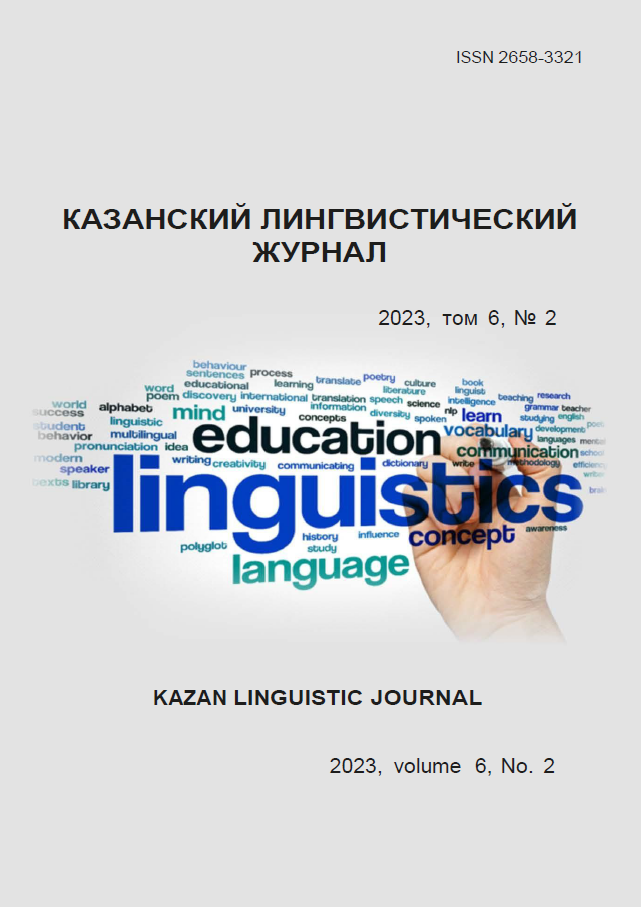Diplomatic discourse in the modern paradigm of approaches to foreign language teaching
https://doi.org/10.26907/2658-3321.2023.6.2.257-270
Keywords:
diplomatic discourse, foreign language for specific purposes, language of diplomacy, diplomatic terminology, interdisciplinarity, language teaching approachesAbstract
The necessity of implementing changes to methods of teaching diplomatic discourse in a foreign language has become apparent against the background of recent social and economic changes, digital technology development and transformation of the system of international relations. The article analyses the reasons for and the essence of changes which have occurred in the content of diplomatic discourse over the last decade and relate to its linguistic characteristics and competencies required, and whose development should become part of foreign language educational curricula for future diplomats. Analysis involves genre characteristics of diplomatic discourse, its lexical and grammatical features, as well as its place in the paradigm of foreign language teaching methods with regard to its inclusion in the category of language learning for general or specific purposes. According to the findings, diplomatic discourse develops in the direction of increased interdisciplinarity of its nature, both from the perspective of constituent elements of diplomatic terminology and that of skills required. Analysing the record of teaching English to future diplomats at English Department №1 of MGIMO University, the authors outline the principal competences fundamental to modern educational curricular in the sphere of language teaching and come to the conclusion that methodology pertinent to the field belongs to the spectrum of methods of teaching languages for specific purposes and, as such, requires a special approach.
References
References
Belyakov M.V. Diplomatic discourse as a type of political discourse. Filologicheskie nauki v MGIMO.2010;41(56):19–26. (In Russ.)
Isakova S.S. Competency-based approach to teaching foreign languages to students of in-ternational relations. Vestnik Bishkekskogo gumanitarnogo universiteta. 2019;3(49):86–88. DOI:10.35254/bhu.2019.49.7. (In Russ.)
Troyanskaya S.L. The basics of competency-based approach in higher education. Izhevsk: Izdatelski tsentr «Udmurtsky universitet»; 2016. (In Russ.)
Paltridge B., Starfield S. (Ed.) The handbook of English for Specific Purposes. Wiley-Blackwell; 2013.
Thornbury S. An A to Z of ELT. Oxford: Macmillan; 2011.
Borisenko I.I., Evtushenko L.I. English in international documents (law, trade, diploma-cy). М.; 2003. (In Russ.)
Bostanjyan L. On communicative-pragmatic specificity of diplomatic discourse. In-ostranniye yaziki v visshey shkole.2014;2(17):104–112. DOI:10.46991/FLHE/2014/18.2.104. (In Russ.)
Yapparova V.N. Diplomatic discourse as the subject of interdisciplinary study. Filologiya I kul'tura. 2016;2(44):165–170. (In Russ.)
Belyakov M.V. Linguoaxiology and linguosemiotics of diplomatic discourse (materials of open professional diplomacy): Doctor of Philology dissertation. М.; 2022. (In Russ.)
Trabelsi Kh. Communicative linguistic analysis of diplomatic discourse: Doctor of Philology dissertation. М.; 2013. (In Russ.)
Kukatova O.A. Speech strategy of opposition and the tactics representing it in the diplomatic discourse. Politicheskaya lingvistika. 2017;4(64):76–80. (In Russ.)
SakayevaL.R., YevsyukovaA.V. Comparative study of formation and process of ex-pansion of the semantic filed ‘diplomacy and foreign policy’ in English and Russian. Kazan linguis-tic journal. 2020;2(3):57–70. DOI: 10.26907/2658-3321.2020.3.2.57–70. (In Russ.)
ABC of International Law. Swiss Federal Department of Foreign Affairs, Bern; 2009.
Evans G. Middle power diplomacy. Available from: https://www.gevans.org/speeches/speech441.html [accessed: 27.02.2023]
Weisbrode K. Diplomacy in Foreign Policy. Oxford Research Encyclopedia of Poli-tics. OUP; 2017. DOI:10.1093/acrefore/9780190228637.013.410.
Palash S. M. Imran. Public Diplomacy in Social Media: An Examination of Twitter Use by Foreign Embassies in the U.S. USA: University of Oklahoma; 2021.
Suwwan N. Within Tweeting Distance: How States Use Twitter Diplomacy. USA: Academica Press; 2022.
Ardayeva N.V. Diplomatic and political discourse. Latin America. Vlast. 2018;26(5):114–117. DOI:10.31171/vlast.v26i5.5831.(In Russ.)
McTague T., Rao P. Leaks Are Changing How Diplomats Talk. The Atlantic, 18.07.2019. Available from: https://www.theatlantic.com/international/archive/2019/07/changing-nature-diplomacy-age-leaks/594226/ [accessed: 15.12.2022]
Terentii L.M. Diplomatic discourse as a special form of political communication. Voprosikognitivnoilingvistiki. 2010;1(22):47–56. (In Russ.)
Pamment J. The New Diplomacy. Wilton Park; 2017.






